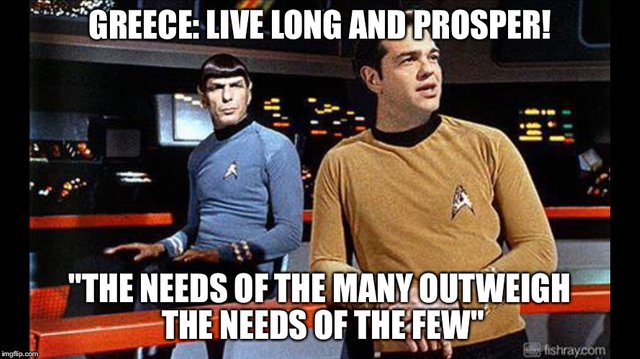The Spock Fallacy
"The needs of the many outweigh the needs of the few, or the one" only works voluntarily

"The needs of the many outweigh the needs of the few" -- Captain Spock, Wrath of Khan
The above scene from what is largely regarded as the best of the classical Star Trek films has given us the captioned quote: they dying Spock, in justification for his Heroic Sacrifice sates that the "needs of the many outweigh the needs of the few". By this he means that he rationally concluded that the value of the entire Enterprise crew, being saveable by the sacrifice of his life, was worth the sacrifice of his life. Spock enters a damaged part of the Enterprise engine core to repair the ship and get it moving again but in the process suffers a lethal radiation dosage, but the ship is saved. Retrospective spoiler alert is too late.
Modern, trendy nerd-socialists love this quote; as in the meme below,it is seen as a "logical" attack on capitalism and the free market. After all, what better way to show how greedy CEOs, at the expense of the 99%, are bad than to have Spock call them "illogical"? What better way to show how government programs that lift of Everybody Else by taxing the 1% is good than to have Spock indicate it is "logical"?

Proof socialists (Greek or otherwise) do not understand logic. Or economics. Or ethics.
The Objective Standard already did a treatment on this, but it falls short (caveat: this author is not an Objectivist) in form and function. They attack the human rationality and individual values angle but fail to address both the actualities of the scene and the fallacies of using the quote in attacking the free market.
The truth of Spock's heroic sacrifice is, in Spock's case, actually quite logical. Had he done nothing, the ship would have been destroyed and him with it (barring of course a random crewman making the same calculation). Spock's specific fate was actually unchanged: either way he would be dead, so he made his death pay for the life of others. Yet even this misses out on an important piece which necessarily collides with the anti-capitalist meme above: Spock made the decision voluntarily for his own sacrifice.
Socialist taxation and other regulatory policies, however, are made by force; a central planner has divined that there is a "greater good" to which you, the few, can be sacrificed and ergo "the needs of the many...yada yada...". The socialist is, as the saying goes, generous with other peoples' money. It is not self-sacrifice, but rather insisting that others must be sacrificed.
Had Spock exercised the same logic, it would have been more rational to mind-meld one of the qualified engineering crewmen to go instead of a senior bridge officer (himself); indeed, it would have been more coldly "logical" for him to use one of the many injured trainee (for those not in the know, the specific voyage in this case was a training run gone horribly wrong) engineers; again, an injured and possibly dying person instead of a senior bridge officer. Or even Mr. Scott himself.
Yet Spock's -- logic based -- ethics would not allow him to do so; he could not, even with the entire crew at stake, force another to sacrifice for the greater good. He had to voluntarily sacrifice himself. Was this a logical ethics decision? Or an irrational "human" moment?
It will now be demonstrated that Spock acted logically, and that said logic actually dismantles the rationale of the meme. Spock was acting based on a logic-based code of ethics which made it impossible to force another to sacrifice for the greater good, that such sacrifice must be based on the sacrificed person's own values.
Spock's ethics were rooted in logic: as such, he understood that the individuals ("the few, or the one") comprise the collective; that is that the many are a collection of a number of "the few, or the one" grouped according to a defining characteristic -- in this case being "about to die in an exploding starship". Spock was no less a member of "the many" nor to any greater degree a member of "the few". He also understood that, should sacrifice "for the greater good" be a thing which can be compelled in spite of the sacrifice's own needs and values then this necessarily means that all members of "the many" may, at any moment, be compelled to sacrifice for the greater good. This means that the greater good must be sacrificed for the greater good -- in short that the entire "many v. few" calculation falls apart as the security of the entire collective is placed on the chopping block.
Thus with socialism, and the meme above, should any be forced to sacrifice "for the greater good", then all are under that same threat. How can loss for all be gain for all?
Socialists circumvent this by creating division in "the many", by making "the few" into a select group of "the many" (such as "the 1%") who are somehow, for purposes of moral value calculation, different than "the many". It is classic "us" versus "them" polarisation which is used to justify action against a small portion of the collective called society: the moral calculation is allowed to circumvent Spock's logic by creating an arbitrary factor which separates "the few" as no longer one of "the many" (or the 1% from the 99% instead of the 100%) and uses that arbitrary factor (such as accumulated wealth or higher income) as justification to force them to sacrifice.
This is no more ethical than Spock forcing Scotty to die for the Enterprise. Spock understood this, why can't socialists?

Thomas Shirk is a computer programmer, Voluntaryist and aspiring philosopher. Please come back to his blog or follow him on Facebook and Steemit for regular updates on Voluntaryism, capitalism and other philosophical insights
I like your texts, don't get me wrong. They are good, basic intros to voluntaryism.
However, I have some criticism.
I'm not sure who you are aiming these at, but if your aim is to open up a dialogue with a common person, who's not clued into all of this, then I'm not sure this is a very good approach. What I mean by that is that while I enjoy this, I am a voluntaryist, so I don't need convincing. The problem with me, though, is that I already agree, so it doesn't necessarily teach me anything new.
For the average dude, the dry, overly logical way of conveying things will never work, because the avreage person is not, and will never be, logical.
So, I'd say try a new, fresh approach. Don't just repeat everything that's been said by voluntaryists. You have the writing talent, so no problem there.
Just some conctructive criticism. :)
Thanks. My goal at present is to build an entire framework of rational ethics, which I obviously believe will inevitably tend to voluntaryism. I see this as a sort of stocking the quiver before the turkey shoot: once engaged, statists often TRY to counter with reason and logic. A rational ethics framework pust me ina a "already answered that over here" position.
...and some are, of course, backhanded counters to Facebook arguments I've already had.